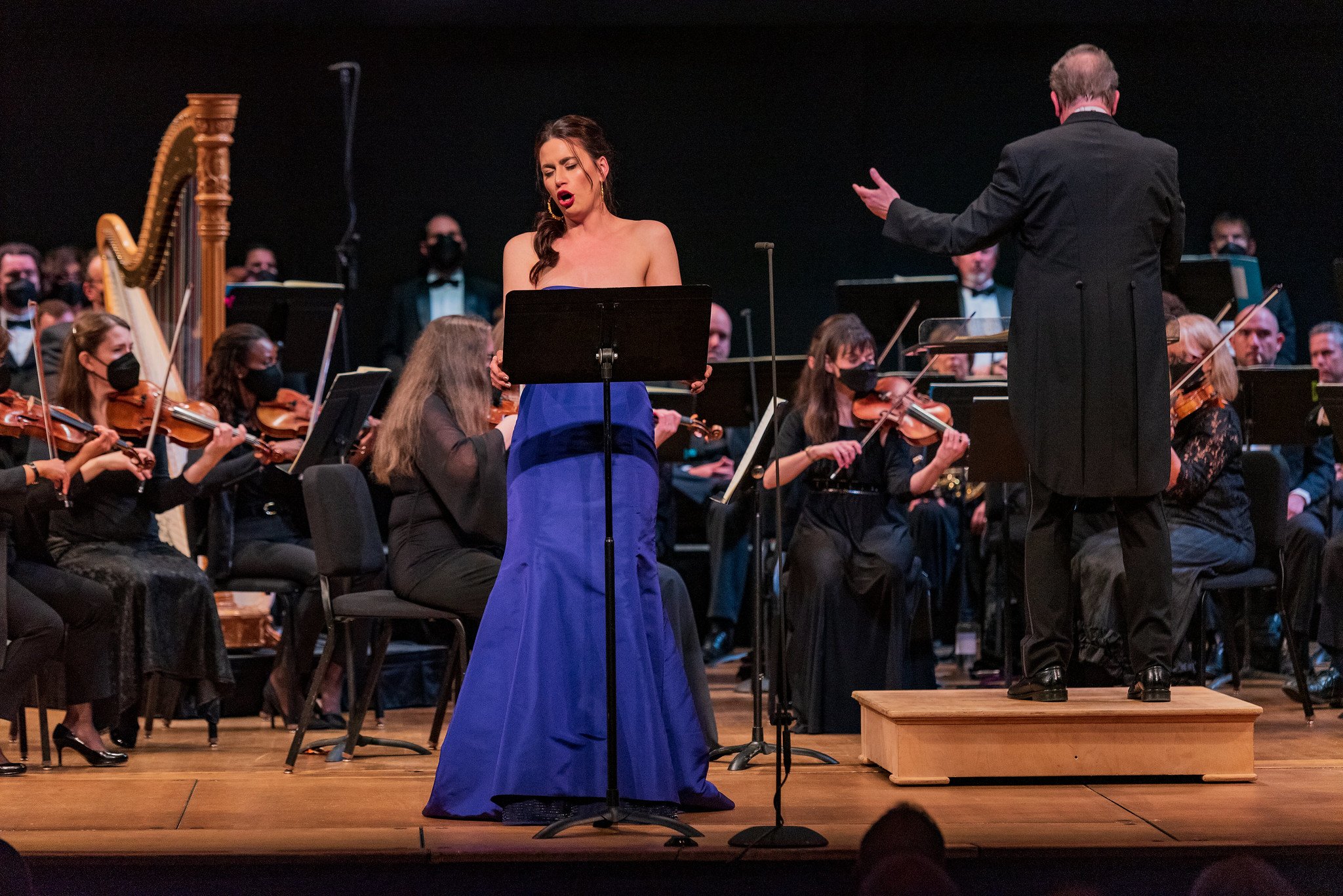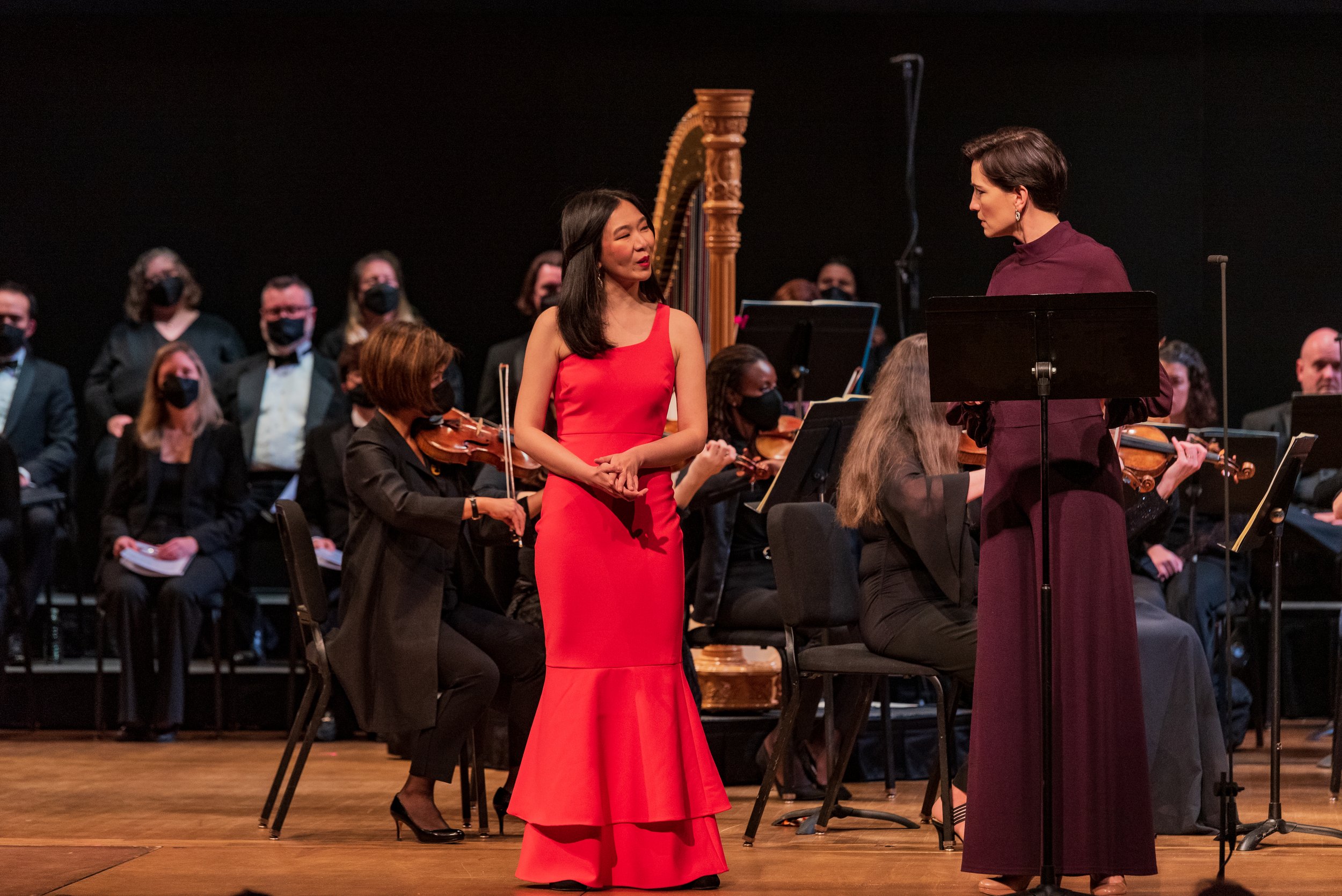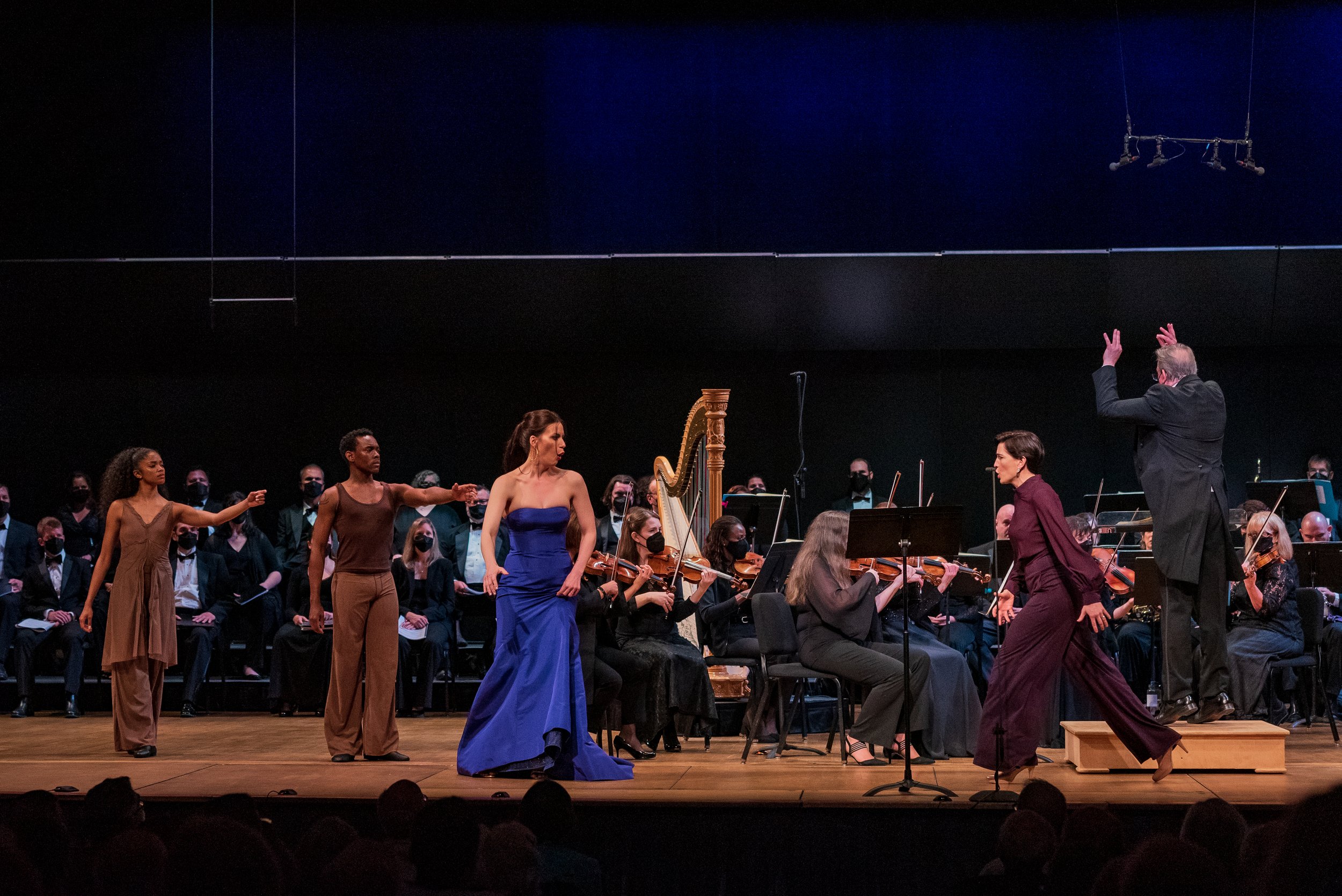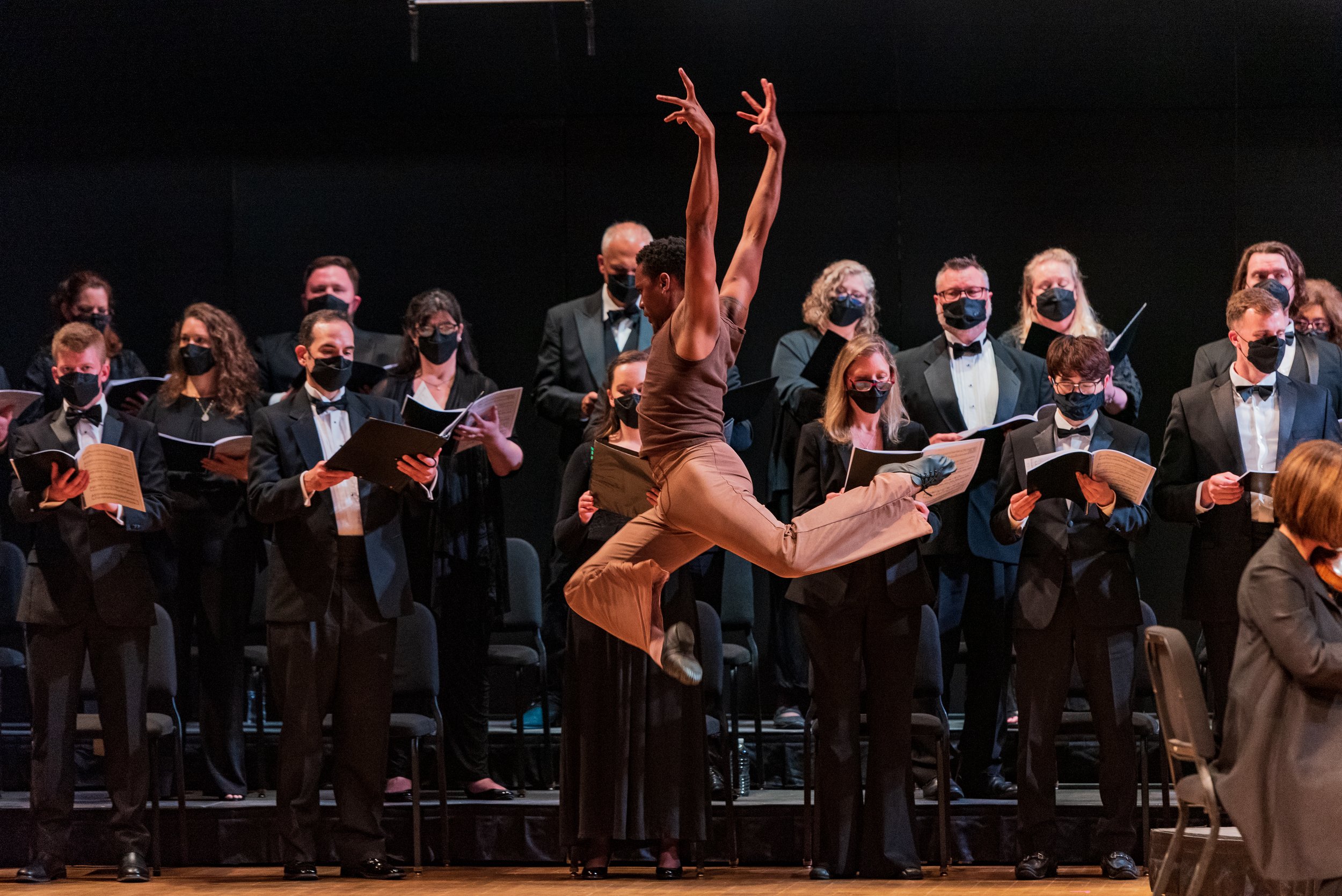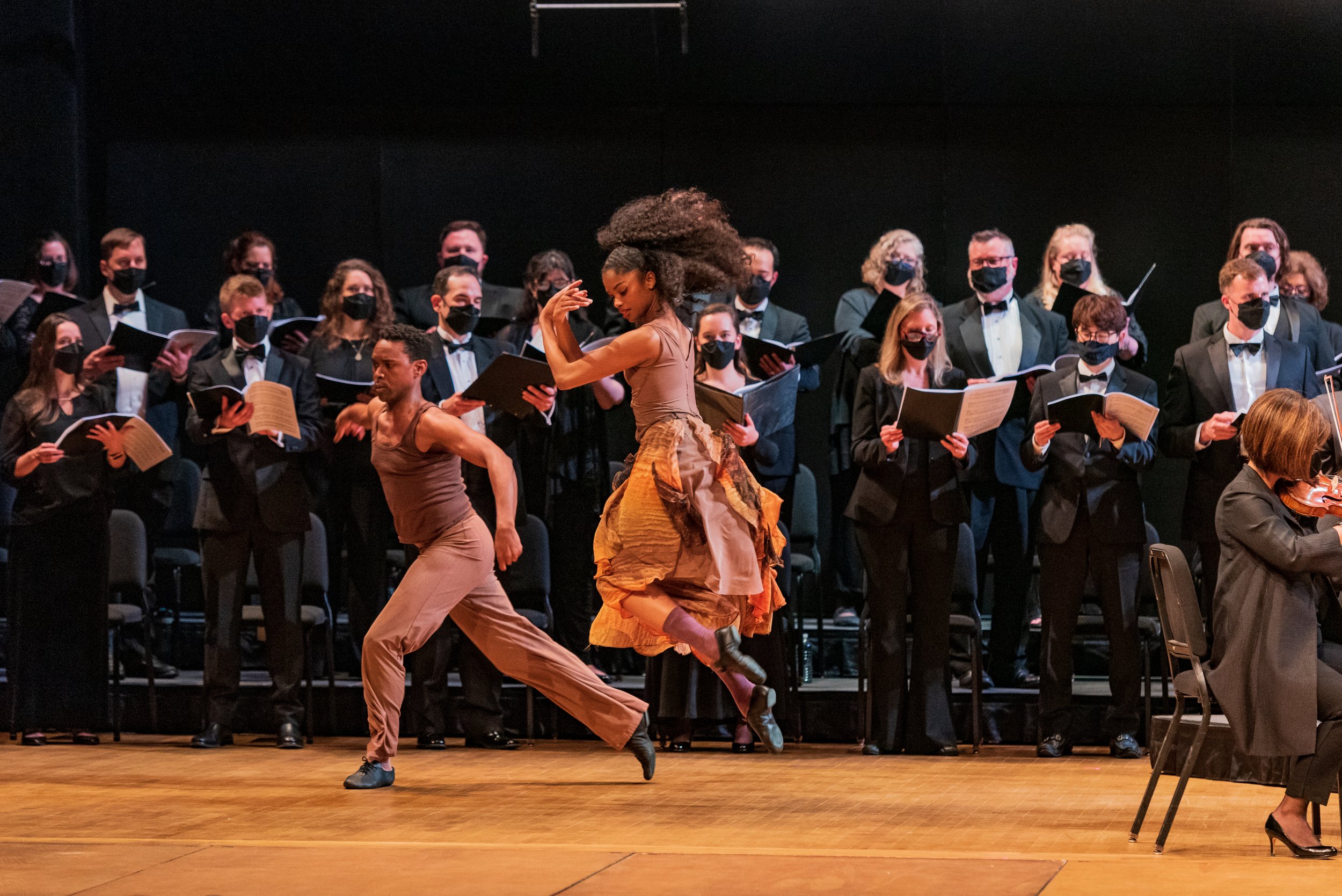Expectations were high for Washington Concert Opera’s Orphée, as discussed in my previous report. WCO chose to present three productions this first season, post the pandemic shutdown years, rather than the normal two. Artistic Director and Conductor Antony Walker chose the Berlioz adaptation of Gluck’s Orfeo ed Euridice for several reasons, including its shortened length of 90 minutes, a limited cast of only three singers with a smaller orchestra and chorus, and the opportunity to again showcase mezzo-soprano Kate Lindsey. Gluck’s work held a special place in Conductor Walker’s heart. He made his conducting debut at the Metropolitan Opera in 2010 with this opera and had long wished for the opportunity to conduct the opera in a smaller setting that would allow him to utilize his ideas in its formulation. WCO’s productions typically approach three hours with use of a large orchestra and chorus. In the case of Orphée, the saying that dynamite comes in a small package comes to mind.
Kate Lindsey as Orphée, backed by the Washington Concert Opera Chorus in WCO’s Orphée on Sunday, April 24. Photo by Caitlin Oldham Photography; courtesy of Washington Concert Opera.
The Orpheus myth begins with him mourning the death of his wife Eurydice; he decides to retrieve her from Hades, using his extraordinary singing skill. Amour, God of Love grants his wish but under one condition. He cannot look at Eurydice while they are leaving or explain why to her. Just before exiting Hades, he whiffs and Eurydice is returned to the Underworld. The Greek myth ends badly for both, but In Gluck’s telling we get a happy ending: Amour is persuaded by Oprhée’s love to return Eurydice to him in the land of the living.
If you will allow me an analogy, we might think of different operas as different culinary dishes, each with its own recipe utilizing a libretto and a score as the principal ingredients, seasoned by performers and presentation. Let’s call German composer Christoph Willibald Gluck and librettist Ranieri de’ Calzabigi’s original 1762 Orfeo ed Euridice an Italian soup. In 1774, Gluck collaborated with librettist Pierre Celeste-Moline to produce a version for Paris in French. To suit the taste and language of those audiences, he changed his recipe significantly. Parisienne audiences of the early 1800s did not want castrati, used in 1762, in their soup, so he changed Orphée’s voice type to a high tenor; they did want more ballet in their soup, so he added more. He also added an ingredient he deliberately avoided in his “reform opera” soup of 1762, coloratura arias, which Parisienne audiences liked.
left photo: Jacquelyn Stucker as Eurydice and Conductor Antony Walker. right photo: Helen Zhibing Huang as Amour (Cupid) and Kate Lindsey as Orphée. Photos by Caitlin Oldham Photography; courtesy of Washington Concert Opera.
Parisienne audiences were growing weary of Gluck’s operas in the early part of the nineteenth century; and the re-tuning of orchestras in Paris to a brighter sound pushed would-be Orphée singers beyond their high tenor limits. Again, the story and the recipe shifts: a young composer Hector Berlioz had become infatuated with Gluck’s music and acted on a suggestion that Orphée et Eurydice be adapted for the lower voice type of opera megastar Pauline Viardot, the leading singer/actor and influencer of her day. The adaptation and her performances were hugely successful. Sometimes you got to do what sells, but as a tribute to Gluck’s genius, all these soups are not only tasty, but nourishing for the soul. The Berlioz adaptation opened the door for mezzo-sopranos to perform in the role, though not just any mezzo-soprano. In the Orpheus myth, he uses the beauty of his singing to charm his way into Hades and back to retrieve his dead wife Eurydice. In each version, it was important to cast a singer possessing a stand-out voice and a sensitive artistry to effectively convey powerful emotions in sometimes subtle ways.
l to r: Nardia Boodoo, Andile Ndlovu, Jacquelyn Stucker, Kate Lindsey, and Conductor Walker. Photo by Caitlin Oldham Photography; courtesy of Washington Concert Opera.
Mezzo-soprano Kate Lindsey is one of the world’s leading mezzos, even though she feels like a local performer. She is a Richmond native; she spent two summers as a Wolf Trap Filene Artist in her youth, and has appeared in three previous WCO productions, I Capuleti e i Montecchi, La favorite, and Sapho, another role popularized by Pauline Viardot. I first saw her in Washington National Opera’s Dead Man Walking in 2016 and commented that I thought this young talent’s performance would improve “as her confidence grows”; in WCO’s Sapho I thought “she owned the stage”, and about Met Opera’s Agrippina, I said, “she was difficult to take your eyes from”. She has blossomed impressively, clearly ready for a role where she does 90% of the singing. Maestro Walker saw her as having qualities of artistry, intellectual breadth, and courage similar to Viardot as well as a similar voice type. She had also been readied to sing the Berlioz version, having been scheduled to do so for a performance in Europe that was canceled by COVID. Sunday night, she was the most professional singer in the room in a group of accomplished professionals, and she was in character for every second of Orphée, her face as well as her singing telling the story - there were tears in the audience. Her voice was beautiful, and her on point singing was often other worldly, perfect for Orpheus. Her coloratura aria at the end of Act I (Amour, viens render à mon ûme, or Love, restore your flame to my soul) was delivered with such force and emotion that the audience exploded with applause when Maestro Walker paused the orchestra. In Sunday’s performance, she commanded the stage and had the audience enraptured.
Maestro Walker had selected an excellent duo of sopranos for the opera’s two supporting roles in their debuts with Washington Concert Opera; Soprano Jaquelyn Stucker as Eurydice sang beautifully, her lovely voice filled with emotion; she was a highlight of the evening even in a small role. Soprano Helen Zhibang Huang as Amour charmed the audience with her bright soprano and her amusing portrayal of Cupid. I hope that performing again in the Washington area will frequently be on both their agendas.
l to r: Andile Ndlovu, Nardia Boodoo, and Kate Lindsey. Photo by Caitlin Oldham Photography; courtesy of Washington Concert Opera.
Concert opera is not staged, singers with accompaniment only, to allow a focus on the singing and the music. This WCO production had something not seen before in WCO performances – dance! I chatted by telephone with Maestro Walker prior to the performance and asked him about adding staging to the performance. WCO had used partial staging for two previous performances, La Cenerentola in 2010 and La vin herbé in 2019, but never dance. He had selected Washington Ballet’s Andile Ndlovu and Nardia Boodoo to work with him, Chorus Master David Hanlon, and the singers (without a stage director), to incorporate dance into the production. He stated:
Andile Ndlovu and Nardia Boodoo. Photos by Caitlin Oldham Photography; courtesy of Washington Concert Opera.
“I decided that, seeing as Orphée is a reformed French baroque opera, where dance is an essential component, I would include two classically trained dancers to dance 6 key set pieces, and to help us tell the story even more clearly and compellingly. Andile Ndlovu and Nardia Boodoo's journey as the dancers in Orphée included starting the opera in a formal, exuberant fashion, transitioning immediately into two grieving mourners at Eurydice’s funeral, then becoming briefly monsters of Hades before expressing the delights and bliss of Elysium with Eurydice. And, of course, they finished the opera with a celebratory flourish! My thought for the dancers was that essentially, they should be a part of the supernatural element of the opera, working for Amour in various capacities, and guiding and testing Orphée: trying to help fulfill Amour’s wish for the lovers to be reunited by assisting in Orphée’s journey from above ground into the Underworld and back. As dancers, these wonderful performers can assume multiple characters and roles in such a drama, and really add a fascinating new artistic dimension to the story telling. Having another male and female couple also express love and grief through dance was a real gift to telling the story. It was the first time in WCO history that dancers were used, and I was really delighted with Andile and Nardia’s artistry and hope that we can incorporate dance into the occasional future work in this similar genre.”
l to r: Nardia Boodoo, Andile Ndlovu, Jacquelyn Stucker, Kate Lindsey, and Conductor Walker. Photo by Caitlin Oldham Photography; courtesy of Washington Concert Opera.
In viewing the performance, I did not perceive all the elements in Maestro Walker’s description, but dancers certainly added another element of beauty. As Orphée entered stage left, she was engaged by the dancers who interacted with each of the singers in telling the story. Mr. Ndlovu, who also choreographed the dance, and Ms. Boodoo are lovely young people whose movements were smooth and flowing. The addition of dance does provide a logistics problem. The orchestra onstage was moved to one half of the stage and the chorus was seated at the back of the other half to allow a performance area for the dancers, but it worked well enough. I would welcome use of dance in future Washington Concert Opera productions. The choice of the singers and dancers for this opera also met another goal for Director Walker. He wanted to “highlight the universality of the experiences of love and grief by casting in a more diverse way”. Ms. Zhibing is Chinese American. Mr. Ndlovu is a native of South Africa and Ms. Boodoo is of Indo-Trinidadian ancestry.
Kate Lindsey and Conductor Walker with the Washington Concert Opera Orchestra and Chorus. Photo by Caitlin Oldham Photography; courtesy of Washington Concert Opera.
I will mention the music last when it should be first. An enjoyable part of Washington Concert Opera performances always is being able to see Maestro Walker and the orchestra on stage, rather than in a pit; Conductor Walker’s movements are a show in themselves. The orchestra and chorus were somewhat smaller than usual but were fully engaging. Maestro Walker made some changes to the Berlioz adaptation, such as changing some aspects of the instrumentation back to the Gluck version. I had not heard Gluck’s opera before in any version, and the music surprised me again and again. Lovely, baroque style melodies appeared throughout the evening and different instruments shone in solo ornamentations, the oboe, the flute, and the harp. But most impressive of all was how much the music supported and added to the drama and its changing moods. The WCO chorus was a delight as usual and even became players in the partial staging of the drama. If they are all members of the same church, let me know; I might sign up. Kudos to Conductor Walker and Chorus Master Hanlon.
My high expectations for the evening were met and exceeded. While perhaps WCO’s Orphée could be improved with more rehearsal time which was short and more time to formulate its elements, the audience was offered an artistic experience being created before our eyes, first rate and exciting. I have no trouble calling it a gem. It engaged; it sparkled; it enriched. It was live and in person! The Berlioz adaptation of Gluck’s Ofeo ed Euridice is definitely a dish I’d like to try again.
The Fan Experience: As with all WCO productions, Sunday night’s performance in Lisner Auditorium was one off. If you missed it, you missed it forever. Orphée was the second of three operas this season; WCO’s final opera of the season will be Lakmé, to be performed on May 22. You might consider adopting my attitude based on many performances I have now attended: I don’t really need for WCO to announce the names of the operas selected for the coming season; just give me the dates, and I will be there.
Kate Lindsey will serve as Wolf Trap Opera’s Filene Artist in Residence this summer. She will perform a recital on July 8 and offer a master class open to the public on July 14.
Opening comments were made by Meg Sippey, WCO’s new Executive Director; she noted she was one week on the job. Peter Russell, General Director of Vocal Arts DC, presented the pre-opera talk and provided program notes. Mr. Russell typically presents a one-hour lecture on WCO’s operas in the free Opera Gems series; the one for Lakmé is scheduled for online presentation for April 28 at 1 pm. Lakmé should last around 2.5 hours, but frankly, I thought 90 minutes for a Sunday evening was not too short.
In my experience, all the seats in Lisner Auditorium are fine for viewing the performance, but the sound is probably better towards the center of the auditorium. Parking on the street around the auditorium is catch as catch can; if you find a spot, the meters are usually turned off on Sunday, but be sure to read the signs! Metro is two blocks away. WCO has a visitor web page with directions and parking info, helpful in finding lot parking.


